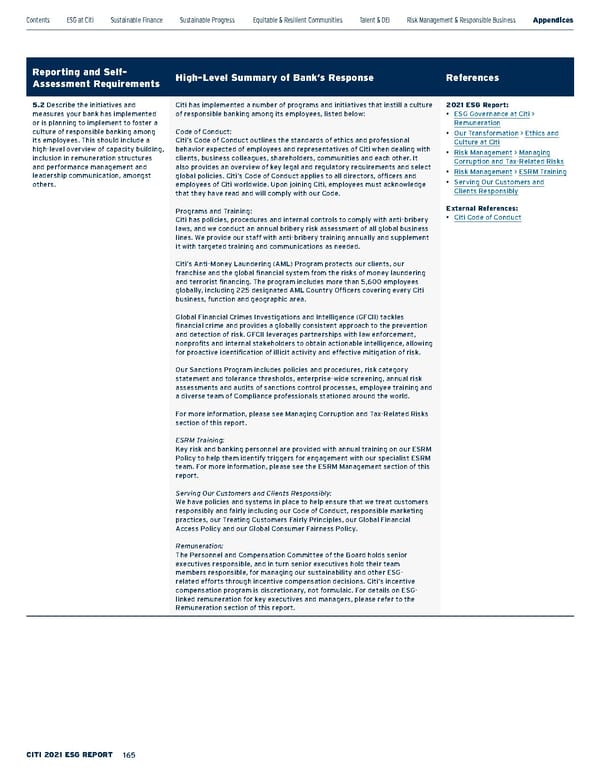Reporting and Self- Assessment Requirements High-Level Summary of Bank’s Response References 5.2 Describe the initiatives and measures your bank has implemented or is planning to implement to foster a culture of responsible banking among its employees. This should include a high-level overview of capacity building, inclusion in remuneration structures and performance management and leadership communication, amongst others. Citi has implemented a number of programs and initiatives that instill a culture of responsible banking among its employees, listed below: Cod e of Conduct: Citi’s Code of Conduct outlines the standards of ethics and professional behavior expected of employees and representatives of Citi when dealing with clients, business colleagues, shareholders, communities and each other. It also provides an overview of key legal and regulatory requirements and select global policies. Citi’s Code of Conduct applies to all directors, officers and employees of Citi worldwide. Upon joining Citi, employees must acknowledge that they have read and will comply with our Code. Programs and Training: Citi has policies, procedures and internal controls to comply with anti-bribery laws, and we conduct an annual bribery risk assessment of all global business lines. We provide our staff with anti-bribery training annually and supplement it with targeted training and communications as needed. Citi’s Anti-Money Laundering (AML) Program protects our clients, our franchise and the global financial system from the risks of money laundering and terrorist financing. The program includes more than 5,600 employees globally, including 225 designated AML Country Officers covering every Citi business, function and geographic area. Global Financial Crimes Investigations and Intelligence (GFCII) tackles financial crime and provides a globally consistent approach to the prevention and detection of risk. GFCII leverages partnerships with law enforcement, nonprofits and internal stakeholders to obtain actionable intelligence, allowing for proactive identification of illicit activity and effective mitigation of risk. Our Sanctions Program includes policies and procedures, risk category statement and tolerance thresholds, enterprise-wide screening, annual risk assessments and audits of sanctions control processes, employee training and a diverse team of Compliance professionals stationed around the world. For more information, please see Managing Corruption and Tax-Related Risks section of this report. ESRM Training: Key risk and banking personnel are provided with annual training on our ESRM Policy to help them identify triggers for engagement with our specialist ESRM team. For more information, please see the ESRM Management section of this report. Serving Our Customers and Clients Responsibly: We have policies and systems in place to help ensure that we treat customers responsibly and fairly including our Code of Conduct, responsible marketing practices, our Treating Customers Fairly Principles, our Global Financial Access Policy and our Global Consumer Fairness Policy. Remuneration: The Personnel and Compensation Committee of the Board holds senior executives responsible, and in turn senior executives hold their team members responsible, for managing our sustainability and other ESG- related efforts through incentive compensation decisions. Citi’s incentive compensation program is discretionary, not formulaic. For details on ESG- linked remuneration for key executives and managers, please refer to the Remuneration section of this report. 2021 ESG Report: • ESG Governance at Citi > Remuneration • Our Transformation > Ethics and Culture at Citi • Risk Management > Managing Corruption and Tax-Related Risks • Risk Management > ESRM Training • Serving Our Customers and Clients Responsibly External References: • Citi Code of Conduct Contents ESGatCiti SustainableFinance SustainableProgress Equitable&ResilientCommunities Talent&DEI RiskManagement&ResponsibleBusiness Appendices ESGS ataC ius niblnG 165
 Citi ESG Report Page 164 Page 166
Citi ESG Report Page 164 Page 166